Jails and Justice Support Center: Screening, Assessment, and Your Jail
SUNDAY, FEBRUARY 4TH | 8:00AM TO 9:00AM | COMMERCE ROOM
Screening and assessment of individuals are key to jail safety. People who are incarcerated in jails often have complex medical and behavioral health needs, and some of these needs may be urgent or emergent. Comprehensive and universal screening and assessment can help identify these needs so they can be addressed promptly to improve an individual’s health outcomes, reduce the risk of self-harm or suicide, and inform decisions about housing placement and relevant programming opportunities. This workshop will explore the fundamental components of effective screening and assessment, how to use the results of screening and assessments in the jail, the benefits of conducting comprehensive screening and assessment, and provide an operational perspective of screening and assessment in the jail. In coordination with the Jails and Justice Support Center (JJSC), participants will receive critical information on screening and assessment, have an opportunity to engage in peer learning, and share their own insights and perspectives.
PRESENTER: Tara Kunkel, Executive Director, Rulo Strategies, Sheriff Peter J. Koutoujian, Middlesex Sheriff’s Office
 Tara Kunkel has served as the Executive Director of Rulo Strategies since 2020. Before founding Rulo Strategies, Tara served as a Senior Drug Policy Advisor at the U.S. Department of Justice, where she led the implementation of the Comprehensive Opioid, Stimulant, and Substance Abuse Program (COSSAP). Under Tara’s leadership, the COSSAP program grew from a $27 million grant program in 2017 to $187 million in 2019. Tara also served as a consultant for the National Center for States for more than nine years leading, managing, and evaluating projects at all points in the justice system, from diversion programs, pretrial supervision, courts, probation, and corrections. Tara Kunkel began her career in the justice field, working for Chesterfield County, Virginia, as a Community Corrections Officer and Criminal Justice Planner. During this time period, she oversaw the development of the day reporting center and adult drug court. Ms. Kunkel has extensive experience managing and directing complex federal grants. She has also led national-scale initiatives at the federal level. Ms. Kunkel holds a bachelor’s degree in psychology from the University of Virginia and a master’s degree in social work from Virginia Commonwealth University
Tara Kunkel has served as the Executive Director of Rulo Strategies since 2020. Before founding Rulo Strategies, Tara served as a Senior Drug Policy Advisor at the U.S. Department of Justice, where she led the implementation of the Comprehensive Opioid, Stimulant, and Substance Abuse Program (COSSAP). Under Tara’s leadership, the COSSAP program grew from a $27 million grant program in 2017 to $187 million in 2019. Tara also served as a consultant for the National Center for States for more than nine years leading, managing, and evaluating projects at all points in the justice system, from diversion programs, pretrial supervision, courts, probation, and corrections. Tara Kunkel began her career in the justice field, working for Chesterfield County, Virginia, as a Community Corrections Officer and Criminal Justice Planner. During this time period, she oversaw the development of the day reporting center and adult drug court. Ms. Kunkel has extensive experience managing and directing complex federal grants. She has also led national-scale initiatives at the federal level. Ms. Kunkel holds a bachelor’s degree in psychology from the University of Virginia and a master’s degree in social work from Virginia Commonwealth University
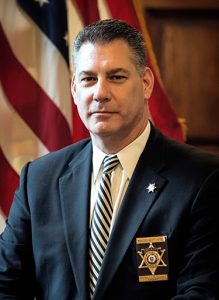 As a prosecutor, legislator, professor, and law enforcement leader, Sheriff Peter J. Koutoujian has worked on the leading issues in public safety and public health throughout his career.
As a prosecutor, legislator, professor, and law enforcement leader, Sheriff Peter J. Koutoujian has worked on the leading issues in public safety and public health throughout his career.
Sheriff Koutoujian holds a master’s degree in public administration from Harvard University’s Kennedy School of Government, a law degree from the New England School of Law, and a bachelor’s degree in psychology from Bridgewater State University. He maintains his academic involvement by continuing to teach criminal justice and leadership courses at several New England area institutions.
As sheriff, Peter Koutoujian’s use of specialty units has reimagined the correctional landscape. By targeting treatment towards unique populations such as young adults and military veterans, these programs have directly and substantially reduced recidivism in their participants. These results have been published in academic journals, featured by national news outlets, and labeled as best practices by multiple presidential administrations.
More importantly, Sheriff Koutoujian’s commitment to data-driven research has made these programs and their results replicable across the country. In light of his commitment to the profession, Sheriff Koutoujian was elected by his statewide and national peers to serve as both the President of Major County Sheriffs of America and the Massachusetts Sheriffs’ Association.
Sheriff Koutoujian proudly works with several national organizations on issues essential to public health & safety. He serves on the Board of Directors for the U.S. Department of Commerce’s First Responder Network Authority, the Executive Committee for the Council of State Governments (CSG) Justice Center, The Executive Board of Law Enforcement Leaders to Reduce Crime & Incarceration, and the Advisory Board for the States United Democracy Center.
For Smaller and Rural Sheriff Offices; How Do I Work “FREE” Into My Budget
SUNDAY, FEBRUARY 4TH | 8:00AM TO 9:00AM | STATE ROOM
The foundation of American law enforcement are agencies with 25 officers or less. These agencies have the same issues as the larger ones, especially when it comes to their operating budget. There are just some items that will be a cost to any agency, but there are other items that are available for free; such as training, equipment loan, analytical services, resources, and technical assistance. There are national programs designed to provide free services to sheriff offices, especially when it comes to the most current training in the areas of cybercrime, investigations skills, de-escalation, intelligence, and information sharing. The Department of Justice has entities within the Department to provide free training, resources, and technical assistance to assist smaller rural sheriff offices to combat violent crime, assist victims, battle high-tech crime, and assist with investigations. Not everything has a price. During this workshop the attendees will be given an overview of services available to them for free. The presenters will also provide links to these resources for easy access.
PRESENTERS: David Lewis, Senior Policy Advisor – Law Enforcement Operations, Jeffrey Lybarger, Vice President, National White Collar Crime Center (NW3C), Thomas L’Esperance, Senior Manager, Institute for Intergovernmental Research (IIR), Matt McDonald, Regional Information Sharing Systems (RISS) Chief Information Officer (CIO)
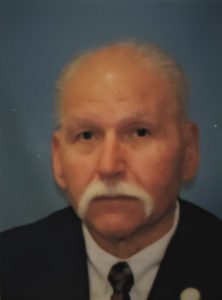 David P. Lewis is a Senior Policy Advisor for the Bureau of Justice Assistance in the Law Enforcement Operations section. He has led several successful justice information sharing projects like the, the National Motor Vehicle Title Information System (NMVTIS) Law Enforcement Access Tool (LEAT) and the Nationwide SAR (Suspicious Activity Reporting) Initiative (NSI). His portfolio includes these programs; Regional Information Sharing Systems (RISS), State and Local Anti-Terrorism Training (SLATT), the Department’s Criminal Intelligence (28 CFR Part 23) training and technical assistance program, National White Collar Crime Center (NW3C), and the Prescription Drug Monitoring Program (PDMP). His team is currently the lead on the development and implementation of the National Ashanti Alert Network initiative. Before joining BJA, David served as the Project Director for both the Ohio Justice Information Network (OJIN) and the Ohio Juvenile Justice Information System (JJIS) at the Ohio Office of Criminal Justices Services, a Governor’s Cabinet Agency. Prior to moving to Columbus, Ohio, he served 24 years in law enforcement retiring from the Cranberry Township Police Department, Pennsylvania, as the Support Services Commander in charge of training, community programming, Internet/high tech investigations, media relations, and the department’s computer projects.
David P. Lewis is a Senior Policy Advisor for the Bureau of Justice Assistance in the Law Enforcement Operations section. He has led several successful justice information sharing projects like the, the National Motor Vehicle Title Information System (NMVTIS) Law Enforcement Access Tool (LEAT) and the Nationwide SAR (Suspicious Activity Reporting) Initiative (NSI). His portfolio includes these programs; Regional Information Sharing Systems (RISS), State and Local Anti-Terrorism Training (SLATT), the Department’s Criminal Intelligence (28 CFR Part 23) training and technical assistance program, National White Collar Crime Center (NW3C), and the Prescription Drug Monitoring Program (PDMP). His team is currently the lead on the development and implementation of the National Ashanti Alert Network initiative. Before joining BJA, David served as the Project Director for both the Ohio Justice Information Network (OJIN) and the Ohio Juvenile Justice Information System (JJIS) at the Ohio Office of Criminal Justices Services, a Governor’s Cabinet Agency. Prior to moving to Columbus, Ohio, he served 24 years in law enforcement retiring from the Cranberry Township Police Department, Pennsylvania, as the Support Services Commander in charge of training, community programming, Internet/high tech investigations, media relations, and the department’s computer projects.
He holds a bachelor’s degree in criminal justice from the University of Dayton, a Master’s Degree in Regional Planning from the California University of Pennsylvania, and a dual MBA in Business Management and Information Systems from Point Park University, Pittsburgh, PA., and is adjunct professor at the Butler County Community College.
 Jeffrey D. Lybarger is a Vice President for the National White Collar Crime Center (NW3C) responsible for the daily operations, grant management, and oversight of NW3C Curriculum Development and Training. Prior to his current position, Jeff served as the Director of Training, Manager of the High-Tech Crimes Section, Supervisor of the Internet Crime Complaint Center, NW3C Training Instructor, and NW3C Internet Crime Analyst. Prior to managing the High-Tech Crimes Section, Jeff was the Supervisor of the Internet Crime Complaint Center (IC3), a joint partnership between NW3C and the Federal Bureau of Investigation (FBI) in Fairmont, WV. While in this capacity, Jeff was responsible for overseeing the tasks and analytical functions of several NW3C analysts as it related to Internet crime investigations.
Jeffrey D. Lybarger is a Vice President for the National White Collar Crime Center (NW3C) responsible for the daily operations, grant management, and oversight of NW3C Curriculum Development and Training. Prior to his current position, Jeff served as the Director of Training, Manager of the High-Tech Crimes Section, Supervisor of the Internet Crime Complaint Center, NW3C Training Instructor, and NW3C Internet Crime Analyst. Prior to managing the High-Tech Crimes Section, Jeff was the Supervisor of the Internet Crime Complaint Center (IC3), a joint partnership between NW3C and the Federal Bureau of Investigation (FBI) in Fairmont, WV. While in this capacity, Jeff was responsible for overseeing the tasks and analytical functions of several NW3C analysts as it related to Internet crime investigations.
As the Director of Training, Jeff was responsible for overseeing the economic crime and intelligence analysis curriculum and training. In this capacity, Jeff oversaw the planning, assignment, and direction of NW3C training instructors and curriculum development staff. Jeff was also responsible for grant management, budgeting, and resource allocation. Jeff is a Certified Fraud Examiner (CFE) as well as a Certified Economic Crime Forensic Examiner (CECFE). Jeff holds a bachelor’s degree in criminal justice from Fairmont State University and a master’s degree from West Virginia University.
 Tom L’Esperance is a senior manager and oversees the National Policy Engagement program at the Institute for Intergovernmental Research (IIR). He has an extensive background in project management, development and implementation related to information and intelligence sharing projects and programs at the federal, state and local level.
Tom L’Esperance is a senior manager and oversees the National Policy Engagement program at the Institute for Intergovernmental Research (IIR). He has an extensive background in project management, development and implementation related to information and intelligence sharing projects and programs at the federal, state and local level.
Mr. L’Esperance is an experienced law enforcement officer and executive, having served twenty-eight years as a Vermont State Trooper, the last six as Director/Colonel, retiring in 2015. While serving as the Director, he created and implemented a multi-faceted strategic plan which provided comprehensive direction and guidance to state police members, partner agencies, and stakeholders across Vermont to combat crime and the opioid epidemic devastating the Northeast.
His background includes four years of service with the Federal Government. As a Deputy Program Manager in the Senior National Intelligence Service at ODNI, he led division staffs in information sharing and safeguarding projects, strategic planning, governance, and ongoing development of key mission partner relationships. While at the U.S Department of Homeland Security he was the Law Enforcement Advisor for the office Intelligence and Analysis.
 Matthew McDonald is the Regional Information Sharing Systems (RISS) Chief Information Officer (CIO). Mr. McDonald serves under the authority of the RISS National Policy Group. As the RISS CIO, Mr. McDonald represents RISS and its interests at the national level and promotes the value of RISS services, programs, and resources. He serves as the liaison and national point of contact to provide updates and education on RISS-related initiatives and to further develop partnerships. Mr. McDonald maintains and fosters opportunities to present RISS’s solutions for information sharing, deconfliction, and investigative support.
Matthew McDonald is the Regional Information Sharing Systems (RISS) Chief Information Officer (CIO). Mr. McDonald serves under the authority of the RISS National Policy Group. As the RISS CIO, Mr. McDonald represents RISS and its interests at the national level and promotes the value of RISS services, programs, and resources. He serves as the liaison and national point of contact to provide updates and education on RISS-related initiatives and to further develop partnerships. Mr. McDonald maintains and fosters opportunities to present RISS’s solutions for information sharing, deconfliction, and investigative support.
Prior to joining RISS, Mr. McDonald served 23 years with the Philadelphia, Pennsylvania, Police Department, including the areas of Patrol, Burglary Detail, the Major Investigations Division, and the West Detective Division. He also served on task forces with the U.S. Drug Enforcement Administration (DEA), the Organized Crime Intelligence Unit and DEA Administration Violent Traffickers Project, and the Alcohol, Tobacco, Firearms and Explosives’ Philadelphia/Camden High Intensity Drug Trafficking Area Task Force.
Mr. McDonald holds a Master of Science degree in Criminal Justice and a Bachelor of Science degree in Sociology, with a minor in Criminal Justice, from St. Joseph’s University in Philadelphia. From 1979 to 2001, he also completed and instructed on numerous specialized investigative trainings—including drug identification, undercover and surveillance techniques, use of electronic wire intercepts, dignitary protection, hostage negotiation, money laundering, and secure Web-based communications systems.
Virtual Command Center: A Tool for Tactical Information Sharing
SUNDAY, FEBRUARY 4TH | 10:00AM TO 11:00AM | COMMERCE ROOM
In the modern law enforcement environment, agencies need to share information, collaborate, and join forces to combat crime and terrorism. The FBI’s Virtual Command Center (VCC) is a secure, critical incident management system providing real-time situational awareness.? VCCs foster multi-agency collaboration, allowing federal, state, local, tribal, military, and territorial users to seamlessly share data and make rapid, coordinated decisions for events such as active shooter, child abductions, presidential inaugurations, takedown operations, natural disasters, special events, terrorist attacks, and threats.
Because of the VCC’s flexibility, it can be used or viewed from multiple geographic locations, not just those physically present at an event or a “brick and mortar” command center. Law enforcement can effectively manage a tactical incident in real time, 24/7, with both operational and technical support. As the VCC receives and posts relevant information and intelligence, it provides a comprehensive account of an incident or event to designated law enforcement channels. The VCC promotes versatility as the law enforcement community has used it not only for operational needs and special investigations, but for major events such as NASCAR races, republican and democratic national conventions, presidential inaugurations, the Super Bowl, the Pro Bowl, the Academy Awards, and during weather related emergencies, such as hurricanes.
The VCC is available at no cost to users with a valid criminal justice function, 24 hours a day, 365 days a year, from any secure internet connected device by going to http://www.cjis.gov and requesting a Law Enforcement Enterprise Portal account.
PRESENTER: Rachel Burney, Liaison Specialist, FBI
Rachel Temple Burney is a Liaison Specialist on the Virtual Command Center (VCC) Team in the Data Sharing Services Unit (DSSU) of the Federal Bureau of Investigation (FBI) Criminal Justice Information Services (CJIS) Division. Ms. Burney has been with the VCC Team since 2016 and an employee in the FBI CJIS Division’s Data Sharing Services Unit (DSSU) since 2007. Ms. Burney began her FBI career at the Law Enforcement Enterprise Portal (LEEP) Help Desk on LSU’s campus in Baton Rouge, LA before moving to Chicago, IL where she spent four years working in the FBI Chicago Field Office. In 2019 Ms. Burney relocated and began working at FBI Headquarters in Washington, DC, where she currently resides. Ms. Burney received a bachelor’s degree in Mass Communication/Public Relations from Louisiana State University in May 2006.
How a Dedicated Family Support Services Unit Improved Correctional Programming, Inmate Welfare, and Officer Safety
SUNDAY, FEBRUARY 4TH | 10:00AM TO 11:00AM | STATE ROOM
In February of 2020, Sheriff Peter J. Koutoujian and the Middlesex Sheriff’s Office (MSO) established a first-of-its kind program called the Family Support Services Unit (FSSU).
The Sheriff created this unique unit because he felt family and loved ones of the incarcerated are overlooked by those in the correctional system. Through targeted programming and outreach, the FSSU has been able to take families from an after-thought to critical stakeholders for re-entry.
As with all specialized MSO initiatives, FSSU sought to address known population needs, including:
- Providing a standard avenue of communication with families of the incarcerated regarding MSO care and custody.
- Developed individualized re-entry plans that are family-focused and encourage pro-social bonding.
- Centralizing efforts to offer additional state support and resources to family members impacted by incarceration.
This presentation will walk through the research behind family support units, as well as the inception of FSSU prior to the COVID-19 pandemic and its subsequent impacts. Attendees will be provided with the latest white paper on FSSU’s success, and get a first look at the next stages of growth for the program.
PRESENTERS: Sheriff Peter J. Koutoujian, Middlesex Sheriff’s Office
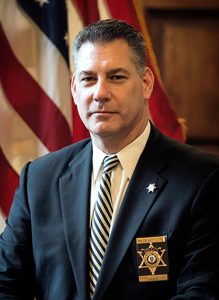 As a prosecutor, legislator, professor, and law enforcement leader, Sheriff Peter J. Koutoujian has worked on the leading issues in public safety and public health throughout his career.
As a prosecutor, legislator, professor, and law enforcement leader, Sheriff Peter J. Koutoujian has worked on the leading issues in public safety and public health throughout his career.
Sheriff Koutoujian holds a master’s degree in public administration from Harvard University’s Kennedy School of Government, a law degree from the New England School of Law, and a bachelor’s degree in psychology from Bridgewater State University. He maintains his academic involvement by continuing to teach criminal justice and leadership courses at several New England area institutions.
As sheriff, Peter Koutoujian’s use of specialty units has reimagined the correctional landscape. By targeting treatment towards unique populations such as young adults and military veterans, these programs have directly and substantially reduced recidivism in their participants. These results have been published in academic journals, featured by national news outlets, and labeled as best practices by multiple presidential administrations.
More importantly, Sheriff Koutoujian’s commitment to data-driven research has made these programs and their results replicable across the country. In light of his commitment to the profession, Sheriff Koutoujian was elected by his statewide and national peers to serve as both the President of Major County Sheriffs of America and the Massachusetts Sheriffs’ Association.
Sheriff Koutoujian proudly works with several national organizations on issues essential to public health & safety. He serves on the Board of Directors for the U.S. Department of Commerce’s First Responder Network Authority, the Executive Committee for the Council of State Governments (CSG) Justice Center, The Executive Board of Law Enforcement Leaders to Reduce Crime & Incarceration, and the Advisory Board for the States United Democracy Center.
Solving the Reentry Puzzle: Setting the Pieces for Success
SUNDAY, FEBRUARY 4TH | 11:15AM TO 12:15PM | COMMERCE ROOM
The Community Service and Reentry Division (CSRD) brings together Sheriff’s Department resources and community stakeholders, each with their own emphasis and goals, to offer a unified and innovative approach to combat homelessness and reduce recidivism in San Bernardino County. From the moment individuals are booked into custody, the goal is to begin laying the pieces that will become the pathway to their success. Just as each puzzle piece is distinctly unique, so are the needs of each justice involved individual served. Whether the path is through education, psychotherapeutic classes, vocational training or simply providing resources to assist with basic reentry necessities, such as housing or transportation, CSRD is setting the pieces for success.
PRESENTER: Heather Beidler, Program Manager, San Bernardino County Sheriff’s Department
 Heather Beidler is a seasoned law enforcement professional with a wealth of correctional knowledge within the San Bernardino County Sheriff’s Department’s jail system. Throughout her career, Heather has demonstrated a deep commitment to the values of the Sheriff’s Department and a passion for making positive change. Having worked the early part of her career in various positions including booking and staff training, Heather sought out new challenges based on her desire to do more for the community she resided in. In early 2017, Heather co-created the Sheriff’s Assistance Reentry Team (START), proactively working to reduce the recidivism rate for the San Bernardino County jail system. Currently serving as the Inmate Programs Manager in the Community Service and Reentry Division, Heather has devoted the latter part of her career to the betterment of inmates and the community at large.
Heather Beidler is a seasoned law enforcement professional with a wealth of correctional knowledge within the San Bernardino County Sheriff’s Department’s jail system. Throughout her career, Heather has demonstrated a deep commitment to the values of the Sheriff’s Department and a passion for making positive change. Having worked the early part of her career in various positions including booking and staff training, Heather sought out new challenges based on her desire to do more for the community she resided in. In early 2017, Heather co-created the Sheriff’s Assistance Reentry Team (START), proactively working to reduce the recidivism rate for the San Bernardino County jail system. Currently serving as the Inmate Programs Manager in the Community Service and Reentry Division, Heather has devoted the latter part of her career to the betterment of inmates and the community at large.
Drugs, Death, Destruction and U.S. Border
SUNDAY, FEBRUARY 4TH | 11:15AM TO 12:15PM | STATE ROOM
This seminar takes an in-depth and graphic look at the ruthless nature of Transcontinental Criminal Organizations (i.e., Mexican Drug Cartels) and the impact of their criminality on the southern border and across the United States. It delves into the complexity of the TCOs and their role in the illicit drug trade ravaging America and takes an alarming look at the victimization immersed in their business of human trafficking and indentured servitude. See and hear how the sheer violence of TCOs “Mexican Cartels” reach into every state in America as they compete against each other for smuggling routes both on the southern and northern border and better understand how their connection with China and Southeast Asia is expanding their effort to poison Americans with illicit drugs like fentanyl and methamphetamine. The presentation includes first-hand accounts showing the unparalleled violence and victimization TCOs use in their ongoing turf wars and battle for dominance. Understanding the barbarity and brutality of these organizations is fundamental for law enforcement officers nationwide as we continue to battle their growing reach into our country. To defeat the enemy, we must first understand the enemy. That is the purpose of this seminar. It provides an unfiltered and extensive look at the complicated and callous nature of TCOs/Mexican Drug Cartels and their ongoing efforts to intrude into every community in America.
PRESENTER: Sheriff Kieran Donahue, Canyon County Sheriff’s Office
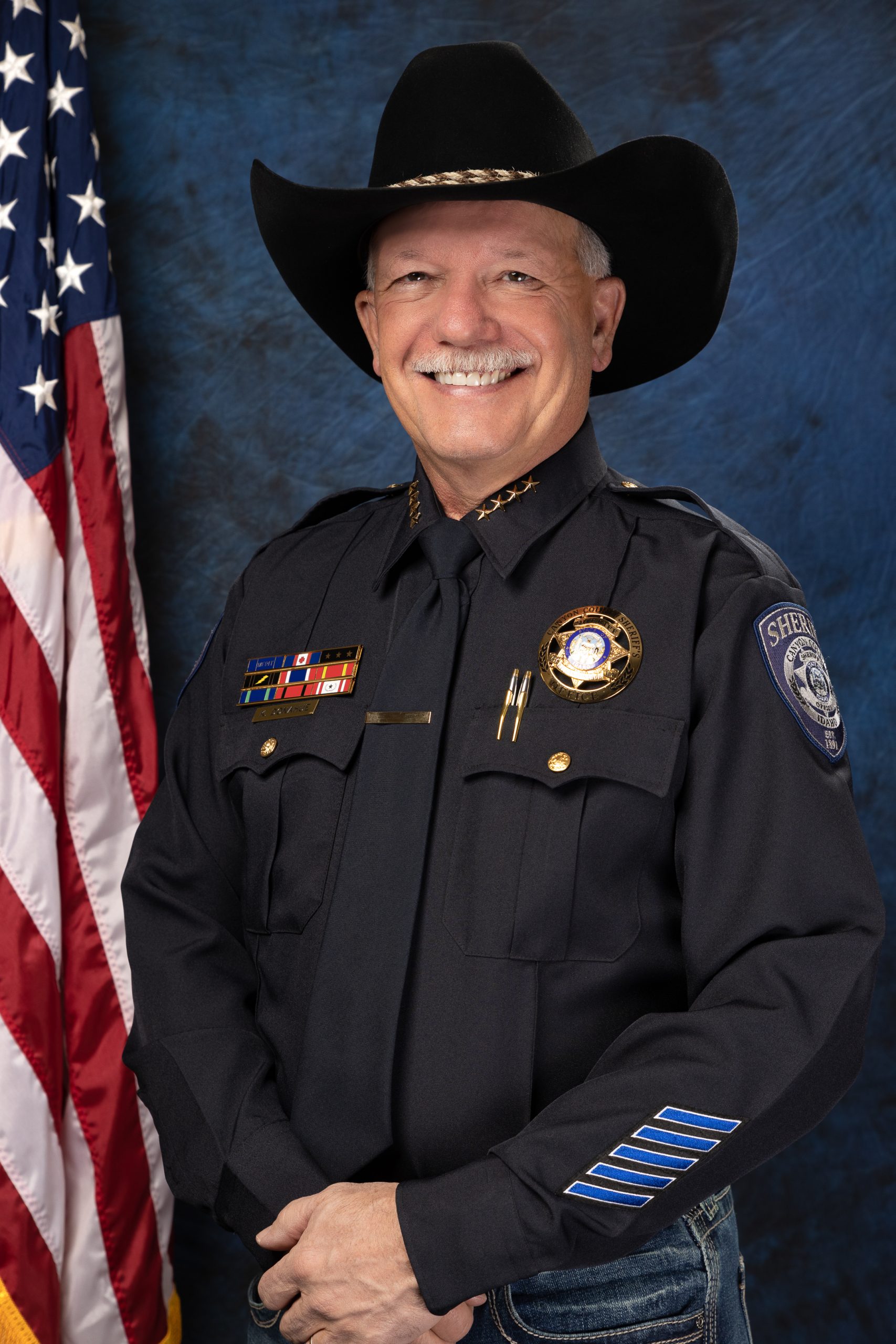 Sheriff Donahue is serving his third term as Sheriff of Canyon County, Idaho. He holds an Executive Certificate with the Idaho Peace Officers Standards and Training (P.O.S.T.), the highest-level certification in Idaho.
Sheriff Donahue is serving his third term as Sheriff of Canyon County, Idaho. He holds an Executive Certificate with the Idaho Peace Officers Standards and Training (P.O.S.T.), the highest-level certification in Idaho.
He has served on numerous National Sheriffs Association (NSA) committees for years, including Government Affairs, Border Security, Domestic Violence and Crime Victim Services, Youth Programs, and Juvenile Justice. In June 2021, Sheriff Donahue was the first Idaho Sheriff to be elected to the National Sheriffs’ Association Executive Committee and is now serving as the 1st Vice President of the NSA.
In March 2022, Governor Little Appointed Sheriff Donahue to Operation Esto Perpetua to meaningfully reduce the flow of fentanyl and methamphetamine into the State of Idaho.
In January 2021, the Governor Appointed Sheriff Donahue to the Idaho Criminal Justice Commission (ICJC) to represent the Sheriffs of Idaho for a four-year term.
Sheriff Donahue is a Past President of the Idaho Sheriffs’ Association (ISA) and a current ISA Board of Directors member. He also holds the position of Chairman of the ISA Legislative Committee and serves on the Idaho Association of Counties Legislative Committee and ISA Jail Standards Committee.
He is a Western States Sheriff’s Association (WSSA) member and serves on the Western States Policy Committee.
Sheriff Donahue is the Founder and Chairman of the Man Up Crusade, a National and International, non-profit, public awareness campaign on the issue of domestic violence.
Sheriff Donahue is a past Chairman and current member of the Executive Board for the Oregon-Idaho High-Intensity Drug Trafficking Area (HIDTA), funded by the DOJ Office of National Drug Control Policy (ONDCP).
Sheriff Donahue is a Keynote Speaker and Subject Matter Expert Lecturer on L.E. matters. Sheriff Donahue holds a top-secret clearance with the Federal Bureau of Investigations (FBI).
Other Honors and Achievements:
- Sheriff Donahue was named Sheriff of the Year by the Western States Sheriff’s Association in
- Sheriff Donahue and his office received the prestigious Crime Victim Services Award for 2017 by the National Sheriff’s Association.
- In 2019, Sheriff Donahue received the Idaho Association of Counties Mills Adler Award for Outstanding Elected Official, voted on by County Elected Officials of the State of Idaho.
- Sheriff Donahue and his office received a National Certificate of Recognition for Outstanding Public Service of Sex Offender Registry Management in 2019.
Developing a Culturally Competent Internal Mental Health Wellness Unit
SUNDAY, FEBRUARY 4TH | 1:45PM TO 2:45PM | COMMERCE ROOM
This seminar is intended to share the process of Escambia County Sheriff’s Office development of an internal Mental Health Wellness Unit for Law Enforcement Officers utilizing culturally competent mental health clinicians. This class will help prepare and equip agencies how to train and employ clinician(s) who share the same lived stress and trauma faced by officers daily. The presentation will break down the truth surrounding Law Enforcement Officers’ mental health wellness and emotional life cycle experienced over the course of their career. The Mental Health Wellness Unit focuses on officer mental health wellness education and providing counseling/therapy services ranging from depression to Post Traumatic Stress Disorder for all the agency employees and family members as an included employment benefit.
In addition to the internal mental health wellness component, the presenter will describe the units’ external services developed to serve the community. This initiative led to the creation of a co-responder team that pairs mental health clinicians with specially trained law enforcement officers who respond to members in the community dealing with mental health issues.
PRESENTER: Colonel Mindy Von Ansbach Young, Escambia County Sheriff’s Office
 Colonel Mindy Von Ansbach Young has been employed with the Escambia County Sheriff’s Office since 1999. Colonel Young is currently the “Officer-In-Charge” for the Mental Health Wellness Unit. She is the Team Commander for the Crisis Negotiations Team and the Crisis Intervention Team Coordinator for the agency.
Colonel Mindy Von Ansbach Young has been employed with the Escambia County Sheriff’s Office since 1999. Colonel Young is currently the “Officer-In-Charge” for the Mental Health Wellness Unit. She is the Team Commander for the Crisis Negotiations Team and the Crisis Intervention Team Coordinator for the agency.Odds & Outlaws: From Legal Sports Betting to Illegal Gambling
SUNDAY, FEBRUARY 4TH | 1:45PM TO 2:45PM | STATE ROOM
This session will give an overview of the legal gaming industry in the United States, including the status of sports betting, while primarily focusing on the dangers posed by illegal and unregulated gambling. Learn how illegal, offshore gambling websites and unregulated so-called “skill game” machines are threatening consumers and how law enforcement can continue to help stop these bad actors.
PRESENTERS: Tres York, Senior Director, Government Relations, American Gaming Association
 Tres York is Senior Director, Government Relations at the American Gaming Association where he leads state advocacy and regulatory engagement.
Tres York is Senior Director, Government Relations at the American Gaming Association where he leads state advocacy and regulatory engagement.
Prior to arriving at the AGA, Tres served as legislative director for the National Conference of State Legislatures (NCSL), a bipartisan organization that represents all 50 state legislatures across the U.S. At NCSL, Tres led advocacy efforts on gaming, financial services and technology issues, both on Capitol Hill and with federal regulators.
He previously led the political affairs operation for the MIBOR Realtor Association, coordinating their fundraising and candidate endorsement efforts, worked as a legislative staffer for the Indiana House of Representatives, and for former U.S. Representative Luke Messer in both federal and political roles.
Tres received his bachelor’s in political science from Indiana University-Purdue University Indianapolis. He currently resides in Alexandria, Virginia with his fiancée.
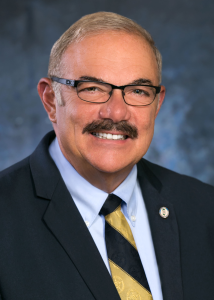 James T. Plousis was sworn in as the eighth chairman of the New Jersey Casino Control Commission in December of 2017 after his appointment by Governor Christie.
James T. Plousis was sworn in as the eighth chairman of the New Jersey Casino Control Commission in December of 2017 after his appointment by Governor Christie.
A native of Philadelphia, Plousis has a law enforcement career that spans more than four decades prior to joining the Commission. He served six terms as Sheriff of Cape May County, beginning in 1984. In 2002, he was sworn in as the United States Marshal for the District of New Jersey, following his nomination by President George W. Bush and confirmation by United States Senate. As U.S. Marshal, he oversaw offices in Newark, Trenton, Camden and Atlantic City.
In 2010, Plousis became chairman of the State Parole Board following his nomination by Governor Christie. Under his leadership, the board coordinated a statewide effort in support of veterans who become involved in the criminal justice system. The board partnered with the American Legion, the N.J. Department of Military and Veterans Affairs, and state and federal law enforcement agencies to address the increasing segment of the inmate population with prior military service.
He served on the board of the Federal Law Enforcement Training Center at Glynco, GA. He is a member of the United States Marshals Survivors Benefit Fund (USMSBF) and has served as the chairman of its executive advisory committee. The USMSBF is a private nonprofit corporation formed for charitable and education disbursements to the surviving family members of active U.S. Marshals, Deputy U.S. Marshals, Marshals Service employees and Special Deputy U.S. Marshals who are killed in the line of duty.
Plousis is a graduate of Slippery Rock University and of the Rutgers University Public Manager Program. He lives in Ocean City and has two adult children.
Recruiting, Hiring, and Retaining the Next Generation of Law Enforcement Officers
SUNDAY, FEBRUARY 4TH | 3:00PM TO 4:00PM | COMMERCE ROOM
Representatives from the BJA Advancing Service-oriented Policing through Inclusion, Relationship-building, & Engagement (ASPIRE) and the NIJ From Research to Reality projects will provide step-by-step guidance on breaking down existing barriers to recruit a sustainable workforce that supports health and wellness and share five game-changing actions for strengthening your organization. Guidance will cover solutions for building trust between police and communities; supporting effective mentoring, peer support, and career development programs; and addressing the stigma associated with policing careers. Tips and strategies learned through research on how to recruit and retain women in the field of law enforcement will also be shared.
PRESENTERS: Kym Craven, Executive Director, NAWLEE, Jenn Rineer, Director | Workforce Wellbeing and Effectiveness Program Center for Public Safety & Resilience, RTI
 Kym Craven is the executive director of the National Association of Women Law Enforcement Executives and the director of the Public Safety Strategies Group LLC. She is a subject matter expert on recruitment, hiring, and retention through both the CRI-TAC and Elevate Blue projects. She often speaks at national conferences both here in the US and across the globe. She has presented at IACLEA, IACP, the World Police Summit, the Sub-Saharan Police Executives Conference, National Institute of Justice Research Conference, AZ Win Conference, and the Police Science Program at the University of Akureyri among others.
Kym Craven is the executive director of the National Association of Women Law Enforcement Executives and the director of the Public Safety Strategies Group LLC. She is a subject matter expert on recruitment, hiring, and retention through both the CRI-TAC and Elevate Blue projects. She often speaks at national conferences both here in the US and across the globe. She has presented at IACLEA, IACP, the World Police Summit, the Sub-Saharan Police Executives Conference, National Institute of Justice Research Conference, AZ Win Conference, and the Police Science Program at the University of Akureyri among others.
 Jenn Rineer has presented research-based solutions to law enforcement workforce challenges in multiple forums, both online and in person. She has presented at the National Institute of Justice Research Conference, the American Society of Evidence Based Policing Conference, and the National Association of Women Law Enforcement Executives Conference, among others. She has also been featured on podcasts about justice workforce issues through RTI’s Just Science podcast and the DOJ COPS Office’s The Beat. Her applied research has involved conducting trainings to law enforcement supervisors on issues of fairness and supportive supervision.
Jenn Rineer has presented research-based solutions to law enforcement workforce challenges in multiple forums, both online and in person. She has presented at the National Institute of Justice Research Conference, the American Society of Evidence Based Policing Conference, and the National Association of Women Law Enforcement Executives Conference, among others. She has also been featured on podcasts about justice workforce issues through RTI’s Just Science podcast and the DOJ COPS Office’s The Beat. Her applied research has involved conducting trainings to law enforcement supervisors on issues of fairness and supportive supervision.
What the Story of the Sheriff’s Saddle Can Teach Us About Being Better Leaders Today and Tomorrow
SUNDAY, FEBRUARY 4TH | 3:00PM TO 4:00PM | STATE ROOM
Most American Sheriffs know about the history of the office of sheriff as it migrated to our shores from England. We love the image of the Western Sheriff on horseback, riding hard and sitting tall in the saddle. Unfortunately, we rarely take the time to unpack the true nature of the Western Sheriff and separate fact from fiction. Join retired Colorado Sheriff Justin Smith as he explores the true nature of the American Western Sheriff through the story of the Sheriff’s Saddle and highlights how the traits of the early Western Sheriffs can provide guidance to today’s sheriffs as they face challenges in their community.
PRESENTER: Justin Smith, Sheriff (Ret.)
 Justin Smith retired in 2023 after serving 3 terms as the Sheriff of Larimer County, Colorado with 33 years of service through the office. Sheriff Smith holds a Bachelor’s Degree in Administration of Justice from Wichita State University as well as a Master’s Degree in Criminal Justice from the University of Colorado’s Graduate School of Public Affairs. He is also a proud graduate of the 223rd Session of the FBI National Academy, the 102nd Session of the National Sheriffs’ Institute as well as the 70th Session of the FBI Law Enforcement Executive Development Seminar. Among his professional associations, he served as the president of the Board of Directors for the County Sheriffs of Colorado as well as a member of the Executive Board for the National Sheriffs Association.
Justin Smith retired in 2023 after serving 3 terms as the Sheriff of Larimer County, Colorado with 33 years of service through the office. Sheriff Smith holds a Bachelor’s Degree in Administration of Justice from Wichita State University as well as a Master’s Degree in Criminal Justice from the University of Colorado’s Graduate School of Public Affairs. He is also a proud graduate of the 223rd Session of the FBI National Academy, the 102nd Session of the National Sheriffs’ Institute as well as the 70th Session of the FBI Law Enforcement Executive Development Seminar. Among his professional associations, he served as the president of the Board of Directors for the County Sheriffs of Colorado as well as a member of the Executive Board for the National Sheriffs Association.
Considering Technical Assistance? Here’s How it Works! Process & Outcomes of CRI-TAC
SUNDAY, FEBRUARY 4TH | 4:15PM TO 5:15PM | COMMERCE ROOM
Whether you are a new Sheriff trying to introduce new strategies or initiatives, or a seasoned executive ready to tackle a lingering challenge or elevate existing programs, support from experts can be a huge benefit. But, requesting “technical assistance” can seem daunting and cumbersome. Enter: the Collaborative Reform Initiative Technical Assistance Center (CRI-TAC), a FREE program of the COPS office and administered by a partnership of eight leading law enforcement authorities, including: NSA, IACP, NOBLE, NTOA, and more. This workshop will detail ways Sheriff’s Offices have leveraged CRI-TAC for free, customized technical assistance to address more than 60 critical topics, including recruiting, hiring, and retention, officer wellness, and mentorship. Join this workshop to hear from CRI-TAC staff, NSA partner liaisons, and Sheriff’s Office representatives about the process of requesting assistance and the outcomes from CRI-TAC deliveries.
PRESENTERS: David Snively, Program Manager, CRI-TAC, International Association of Chiefs of Police, Mitch Cunningham, Chief Law Enforcement Advisor, National Sheriffs’ Association, Jackie Burson, Mental Health Liaison, Charles County, MD, Sheriff’s Office, Emily Jennings, Senior Project Manager, CRI-TAC, International Association of Chiefs of Police
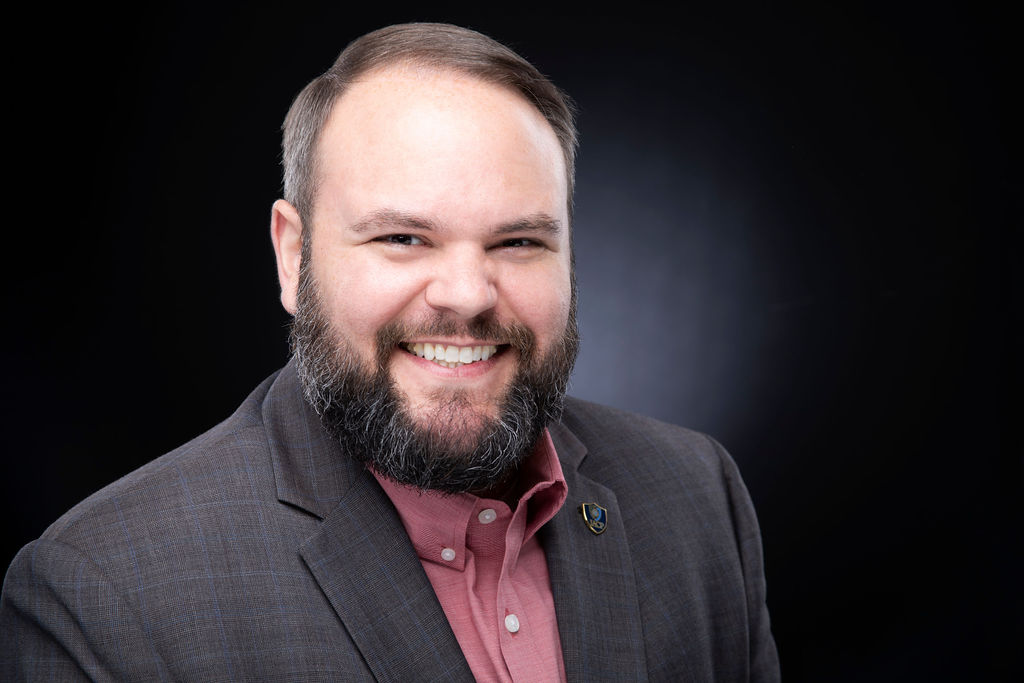 David T. Snively is a Program Manager at the International Association of Chiefs of Police where he oversees the Collaborative Reform Initiative Technical Assistance Center (CRI-TAC).
David T. Snively is a Program Manager at the International Association of Chiefs of Police where he oversees the Collaborative Reform Initiative Technical Assistance Center (CRI-TAC).
David has served in public safety for 17 years, beginning as a 911 dispatcher and rising to Interim Chief of Police; and he remains a sworn reserve police officer. He is a graduate of the Northwestern University School of Police Staff and Command, the Police Executive Research Forum’s Senior Management Institute for Police, and the FBI LEEDA Trilogy. David is a Georgia certified Master Instructor and holds specialty instructor certifications in Use of Force, ICAT, Firearms, TASER, and Field Sobriety. He is also a Use of Force Analyst and a Master Public Information Officer.
In addition to his professional experience, David is a National Institute of Justice LEADS Scholar and an affiliate instructor of Criminal Justice and Criminology at Georgia State University, where he earned his Ph.D. in 2023. His research focuses on police training, education requirements, and policymaking. David earned his master’s degree in public administration from Kennesaw State University, where he was named the 2016 Outstanding Masters Scholar of the Year; and he holds a bachelor’s degree in criminology from the University of West Georgia.
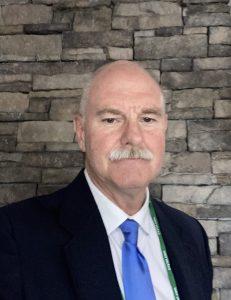 Deputy Chief Mitch Cunningham (ret.) has been a police officer for 37 years, most recently as Deputy Chief for the Wilmington North Carolina Police Department. Prior to that he was a police officer for the Montgomery County Department of Police, in Maryland. There he started a number of crime fighting initiatives including the first Career Criminal Unit, the first regional auto theft team and started the regional data sharing system NCR LInX, in the National Capitol Region which connects hundreds of police agencies, leading to countless arrests and supporting anti-terrorism efforts in the wake of 9-11.
Deputy Chief Mitch Cunningham (ret.) has been a police officer for 37 years, most recently as Deputy Chief for the Wilmington North Carolina Police Department. Prior to that he was a police officer for the Montgomery County Department of Police, in Maryland. There he started a number of crime fighting initiatives including the first Career Criminal Unit, the first regional auto theft team and started the regional data sharing system NCR LInX, in the National Capitol Region which connects hundreds of police agencies, leading to countless arrests and supporting anti-terrorism efforts in the wake of 9-11.
As Deputy Chief for Support Services and later Patrol Bureau at WPD, he started a number of successful efforts to drive down gang violence plaguing the city. He also started the agency’s first Peer Support team, a college scholarship fundraiser Send a Cop to College to assist with the professionalization of its future leaders and implemented the second program in North Carolina that outfitted WPD officers with naloxone. He also began the LEAD program, a pre-arrest diversion program and helped to create the Quick Response Team for the region to help reduce opioid addiction.
He is a certified training instructor who worked as a law enforcement training coordinator for Cape Fear Community College as well as teaching for the University of North Carolina at Wilmington and Louisiana State University. He is currently the Chief Law Enforcement Advisor for the National Sheriffs Association.
 Jackie Burson is the Mental Health Liaison of the Charles County, MD, Sheriff’s Office, a full-service law enforcement agency of medium-large size. Jackie’s inaugural, operational position serves as the Sheriff’s Office authority on mental health. Her primary duties revolve around cultivating employee wellness programming and providing related support services and education. Her career portfolio centers on non-profits and public service, with over a decade of experience in the public mental health sector focused on trauma-informed care and working with persons with complex trauma, dissociative disorders, moral injuries, Veterans, and, most recently, First Responders. Prior to that, she worked in conservation and educational organizations providing grants and office management. She loves teaching, public speaking, and helping others find their “why.”
Jackie Burson is the Mental Health Liaison of the Charles County, MD, Sheriff’s Office, a full-service law enforcement agency of medium-large size. Jackie’s inaugural, operational position serves as the Sheriff’s Office authority on mental health. Her primary duties revolve around cultivating employee wellness programming and providing related support services and education. Her career portfolio centers on non-profits and public service, with over a decade of experience in the public mental health sector focused on trauma-informed care and working with persons with complex trauma, dissociative disorders, moral injuries, Veterans, and, most recently, First Responders. Prior to that, she worked in conservation and educational organizations providing grants and office management. She loves teaching, public speaking, and helping others find their “why.”
 Emily Jennings is the Senior Project Manager for the Collaborative Reform Initiative Technical Assistance Center, a program of the International Association of Chiefs of Police (IACP). The IACP is the world’s largest and most influential professional association for police leaders. With a diverse background in criminal justice, research, and policy, Emily’s experience with IACP includes the provision of leadership services and training, launch of IACP’s One Mind Campaign, coordination of IACP’s Enhancing the Response to Hate Crimes initiative, management of IACP’s Center for Police Research, and development of hate crime investigations training.
Emily Jennings is the Senior Project Manager for the Collaborative Reform Initiative Technical Assistance Center, a program of the International Association of Chiefs of Police (IACP). The IACP is the world’s largest and most influential professional association for police leaders. With a diverse background in criminal justice, research, and policy, Emily’s experience with IACP includes the provision of leadership services and training, launch of IACP’s One Mind Campaign, coordination of IACP’s Enhancing the Response to Hate Crimes initiative, management of IACP’s Center for Police Research, and development of hate crime investigations training.
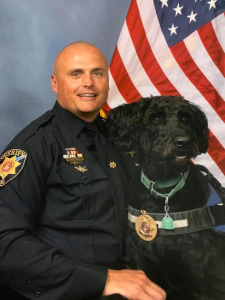 Dan Brite has spent 24 years in law enforcement and 4 years in the U.S. Marine Corps. He was shot in the line of duty on September 2, 2016, and paralyzed from the waist down. The mental and physical struggles from his injuries were a catalyst to Dan’s passion for wellness programming. He continues to work at the Douglas County, CO, Sheriff’s Office, promoting mental, physical, social, and spiritual wellness to all members and their families. Dan is an advocate for mental health in first responders, mental health changes at the state/federal level, and in agencies of all sizes. He is also a subject matter expert in wellness with IACP to help agencies across the country establish wellness programs, and is a board member for It’s a Calling Foundation and an FOP legislative committee member. His goal is to become a mental health therapist that works strictly with first responders, veterans, and their families.
Dan Brite has spent 24 years in law enforcement and 4 years in the U.S. Marine Corps. He was shot in the line of duty on September 2, 2016, and paralyzed from the waist down. The mental and physical struggles from his injuries were a catalyst to Dan’s passion for wellness programming. He continues to work at the Douglas County, CO, Sheriff’s Office, promoting mental, physical, social, and spiritual wellness to all members and their families. Dan is an advocate for mental health in first responders, mental health changes at the state/federal level, and in agencies of all sizes. He is also a subject matter expert in wellness with IACP to help agencies across the country establish wellness programs, and is a board member for It’s a Calling Foundation and an FOP legislative committee member. His goal is to become a mental health therapist that works strictly with first responders, veterans, and their families.
Decreasing jail violence while increasing staff retention through programming
SUNDAY, FEBRUARY 4TH | 4:15PM TO 5:15PM | STATE ROOM
PRESENTER: Scott Wisenbaker, Founder & Executive Director, Solutions of North Texas, Jeff Davis, Captain, CID, Solutions of North Texas
 Scott Wisenbaker is a Speaker, Author, and Founding Executive Director of Solutions of North Texas. (SONTX) Clean and sober since 1995, Scott has worked in the addiction field since 1997. In 2006 he saw the need for a unique approach to fighting addiction on a community level and a robust Re-Entry program to reintegrate men and women recovering from addiction back into the community and founded Solutions of North Texas. SONTX is accredited by the Joint Commission on Accreditation of Healthcare Organizations (JCAHO), licensed as a Chemical Dependency Treatment Center by the State of Texas, and Partnered with The National Sheriff’s Association to provide nationwide addiction and reintegration programming. As of 2023 SONTX has provided direction and/or directly worked with over 20,000 individuals.
Scott Wisenbaker is a Speaker, Author, and Founding Executive Director of Solutions of North Texas. (SONTX) Clean and sober since 1995, Scott has worked in the addiction field since 1997. In 2006 he saw the need for a unique approach to fighting addiction on a community level and a robust Re-Entry program to reintegrate men and women recovering from addiction back into the community and founded Solutions of North Texas. SONTX is accredited by the Joint Commission on Accreditation of Healthcare Organizations (JCAHO), licensed as a Chemical Dependency Treatment Center by the State of Texas, and Partnered with The National Sheriff’s Association to provide nationwide addiction and reintegration programming. As of 2023 SONTX has provided direction and/or directly worked with over 20,000 individuals.
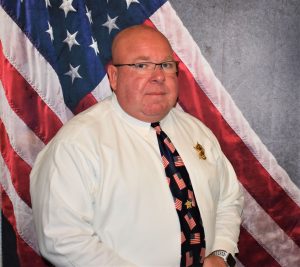 Captain Jeff Davis is a U.S. Army Veteran, serving in Desert Storm/Shield, and has 27 years of law enforcement experience. Captain Jeff Davis currently oversees the Special Operations Division, which encompasses the Drug Enforcement, Criminal Interdiction, K-9, Warrants, and Civil Units. Captain Davis is the Commander for Special Weapons and Tactics (SWAT) and the Crisis and Hostage Negotiation Team. Captain Davis is the NARCAN Program Coordinator and a member of the Denton County Felony Drug Court Team.
Captain Jeff Davis is a U.S. Army Veteran, serving in Desert Storm/Shield, and has 27 years of law enforcement experience. Captain Jeff Davis currently oversees the Special Operations Division, which encompasses the Drug Enforcement, Criminal Interdiction, K-9, Warrants, and Civil Units. Captain Davis is the Commander for Special Weapons and Tactics (SWAT) and the Crisis and Hostage Negotiation Team. Captain Davis is the NARCAN Program Coordinator and a member of the Denton County Felony Drug Court Team.
Captain Davis was awarded the Denton Police Officer of the Year in 2001. He received the National VFW Narcotics Officer of the Year in 2003 and the FBI Golden Eagle Award in 2003.
